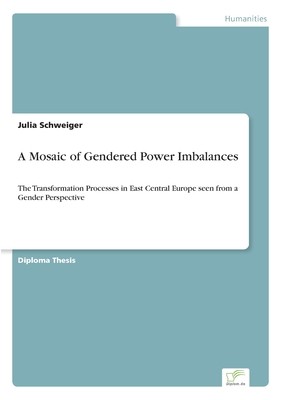
- We will send in 10–14 business days.
- Author: Julia Schweiger
- Publisher: Diplom.de
- ISBN-10: 3838669282
- ISBN-13: 9783838669281
- Format: 14.8 x 21 x 1.1 cm, softcover
- Language: English
- SAVE -10% with code: EXTRA
Reviews
Description
Inhaltsangabe: Summary: Over the last decade, media and politicians have been praising the great economic and democratic progress of the former state socialist countries in East Central Europe. At the same time, however, there have been occasional news about a growing income gap, high female unemployment rates, highly restrictive abortion legislation etc. in those countries. This contradiction caught my attention. In my thesis, I wanted to get to the bottom of it. Thus, the main questions at the beginning of my work were the following: What changed after the implosion of state socialism in the countries of East Central Europe? And how? What were the gendered implications of these changes? What role have the European Union and the possibility of gaining EU membership been playing in the transformation processes - especially regarding the power relations between men and women? I decided to restrict my research to seven former state socialist countries in East Central Europe that are currently candidates for membership in the European Union: Poland, Czechoslovakia, respectively the Czech Republic and the Slovak Republic, Hungary, Slovenia, Bulgaria, and Romania. To approach the questions standing at the beginning of my work, I went way back to early socialist theorists, protagonists, and movements and their ideas and goals. I was particularly interested in women and gender issues in these theories and ideas. The next step was trying to grasp the state socialist reality. From this vantage point, I could finally analyse the changes and transformation processes that have been taking place since the implosion of state socialism. I decided to use a feminist approach with gender as a central category of analysis. This is a very fruitful way to discover and reveal social interconnections, causes and outcomes of economic, political, and social processes, as well as crucial patterns that have been influencing and/or directing the processes in the East Central European count
EXTRA 10 % discount with code: EXTRA
The promotion ends in 19d.17:56:58
The discount code is valid when purchasing from 10 €. Discounts do not stack.
- Author: Julia Schweiger
- Publisher: Diplom.de
- ISBN-10: 3838669282
- ISBN-13: 9783838669281
- Format: 14.8 x 21 x 1.1 cm, softcover
- Language: English English
Inhaltsangabe: Summary: Over the last decade, media and politicians have been praising the great economic and democratic progress of the former state socialist countries in East Central Europe. At the same time, however, there have been occasional news about a growing income gap, high female unemployment rates, highly restrictive abortion legislation etc. in those countries. This contradiction caught my attention. In my thesis, I wanted to get to the bottom of it. Thus, the main questions at the beginning of my work were the following: What changed after the implosion of state socialism in the countries of East Central Europe? And how? What were the gendered implications of these changes? What role have the European Union and the possibility of gaining EU membership been playing in the transformation processes - especially regarding the power relations between men and women? I decided to restrict my research to seven former state socialist countries in East Central Europe that are currently candidates for membership in the European Union: Poland, Czechoslovakia, respectively the Czech Republic and the Slovak Republic, Hungary, Slovenia, Bulgaria, and Romania. To approach the questions standing at the beginning of my work, I went way back to early socialist theorists, protagonists, and movements and their ideas and goals. I was particularly interested in women and gender issues in these theories and ideas. The next step was trying to grasp the state socialist reality. From this vantage point, I could finally analyse the changes and transformation processes that have been taking place since the implosion of state socialism. I decided to use a feminist approach with gender as a central category of analysis. This is a very fruitful way to discover and reveal social interconnections, causes and outcomes of economic, political, and social processes, as well as crucial patterns that have been influencing and/or directing the processes in the East Central European count


Reviews